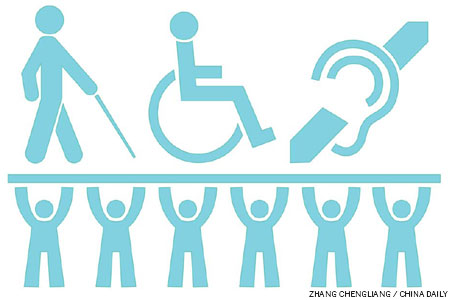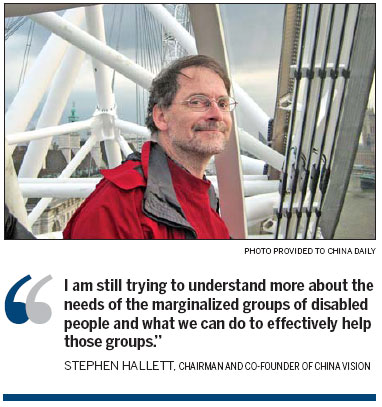


A leading voice for the disabled raises a few concerns, Todd Balazovic reports.
As supporters and campaigners gather to raise awareness for people with disabilities in Beijing, one of the city's veteran campaigners says China still has a long way to go. National Day of Assisting Disabled Persons, which falls every year on the third Sunday of May, is a day when China pauses to reflect on those who live with disabilities ?and Stephen Hallett, chairman and co-founder of China Vision, a UK-based charity for the visually impaired, says while progress is being made, steps still must be taken.
Despite massive efforts by the authorities prior to hosting the Paralympics in 2008, the city still lacks many facilities for the thousands living with disabilities who call Beijing home.
"The Olympics were a great catalyst for change. The infrastructure now is quite good, but the management and maintenance leaves something to be desired," Hallett said.
Hallett, who has no sight in his left eye and limited vision in his right eye due to macular degeneration, a hereditary disorder, has been living in China for more than 20 years. Earlier this year, he received an Order of the British Empire (OBE), one of England's top honorary titles, for his work educating the visually impaired in China for more than a decade.
He said while major metropolitan areas such as Beijing have made vast improvements over the past few years, China's efforts to assist those with disabilities needs to be taken to the countryside.
"There are still parents of disabled children out there who have no idea that, according to Chinese law, their child has the right to get free compulsory education," he said.
China Vision, Hallett's charity organization, aims to bring that information to those who can use it most.
"We want to provide information to those who have the least access to it," he said. "People who don't even know that there are laws and rights they are entitled to, people who, given that information, can transform their lives."
Working with China Vision, Hallett has created a channel to provide information to the visually impaired through what the former BBC documentary maker calls his favorite medium - radio.
Pairing China Vision with Beijing One Plus One radio, an informative radio station broadcast nationwide and produced primarily by people with impaired vision, Hallett has helped to create a voice for those with disabilities broadcast on more than 74 channels with millions of listeners.
Communication is what first brought Hallett to China in 1980 when he began studying Chinese in Beijing before going on to teach English at Beijing Agricultural University.
It wasn't until the 1990s that Hallett moved beyond language and began looking deeper into Chinese culture. Using his 10 years of experience in the Middle Kingdom, Hallett began producing documentaries on China's cultural issues for the BBC World Service.
One of his best-known pieces had Hallett living in a cave dwelling in the Loess Plateau as he followed six women in Shaanxi province, documenting the incompatibility of traditional family values in China with the family planning.
He began his work as an advocate for those with a disability in 1999 after founding China Vision. His dedication to people with visual impairment established Hallett as the representative for the BBC Trust, which governs the media organization's activities in China from 2005 to 2008.
Despite more than a decade of making a big difference, however, Hallett said there's still much work to be done.
"I am still trying to understand more about the needs of the marginalized groups of disabled people and what we can do to effectively help those groups," he said.
Although Hallett, who spends half his time at his home in London, believes Beijing has a way to go before it is fully friendly for those with disabilities, he does give the city credit for major efforts and vast improvement, specifically in the field of public transport.
"I'll admit it, the Beijing subway system is better than the London underground," he said, referring to the world's oldest subway. "Though it does get a bit crowded."
"But for a visually impaired person in Beijing there is still a big problem because the traffic is still chaotic and crossing the roads is still quite dangerous."
(China Daily 05/12/2011 page)